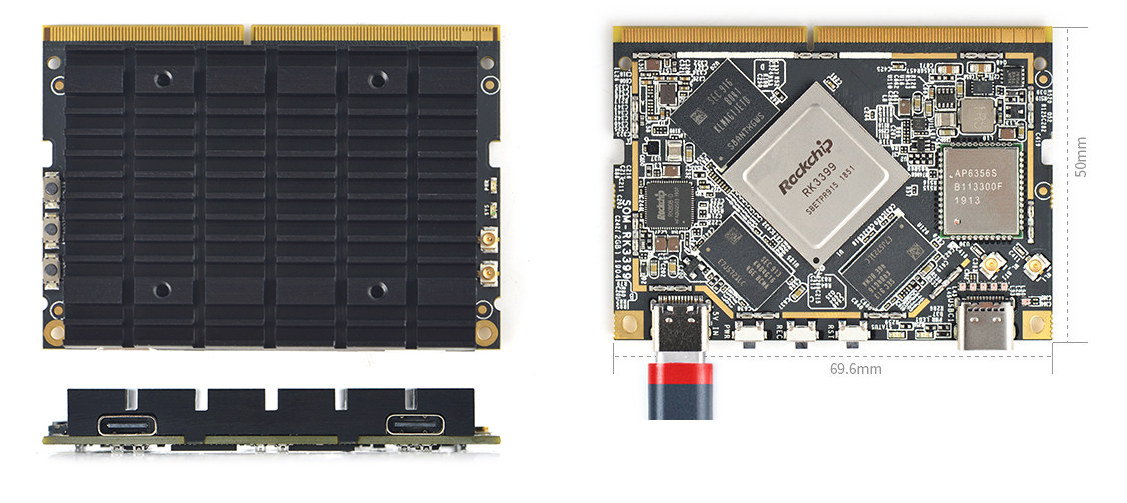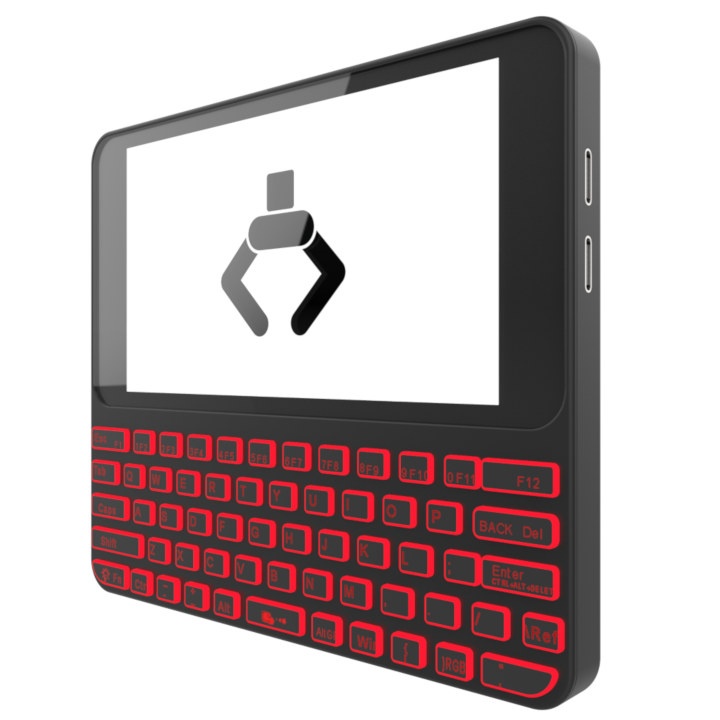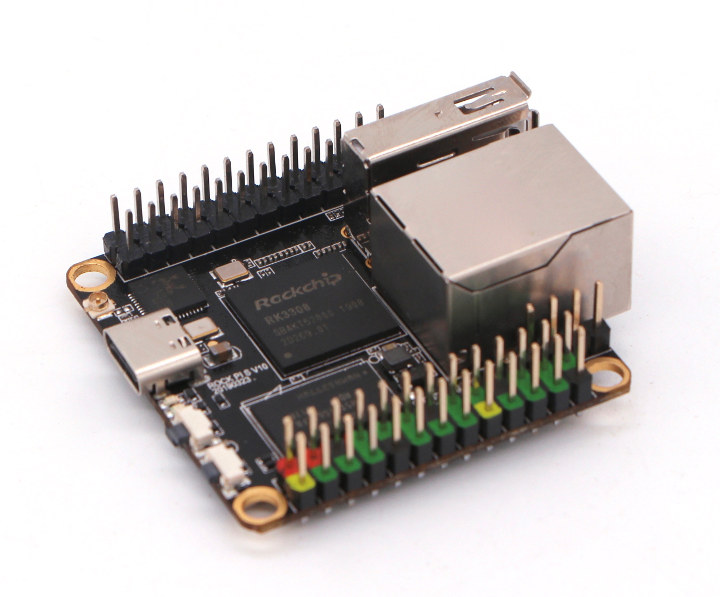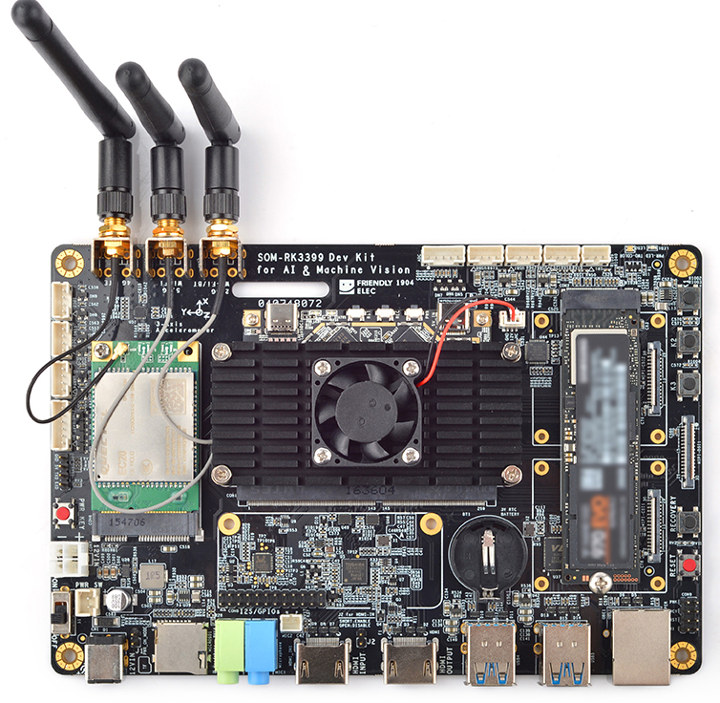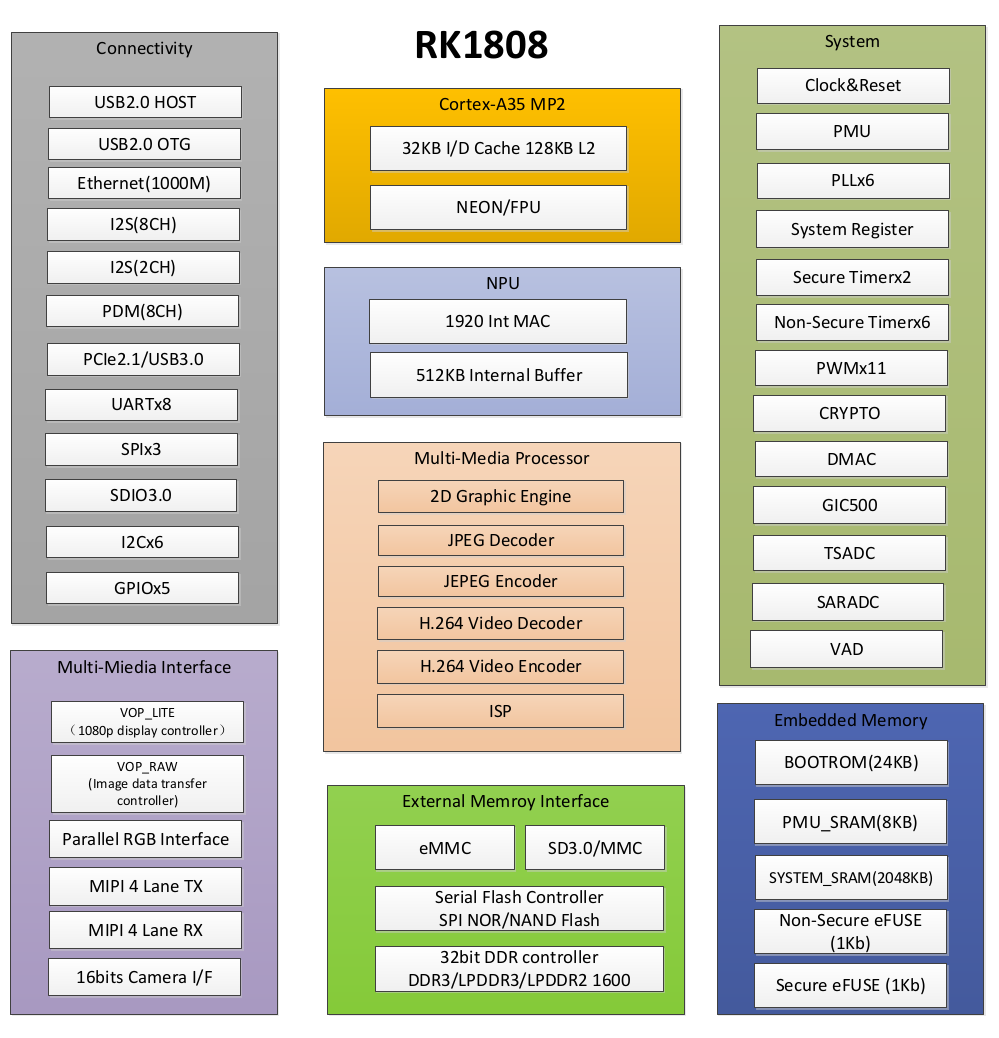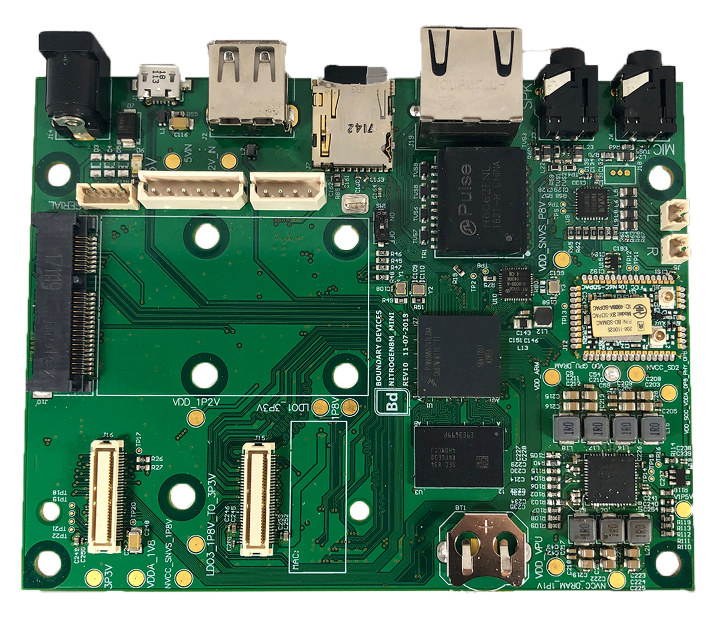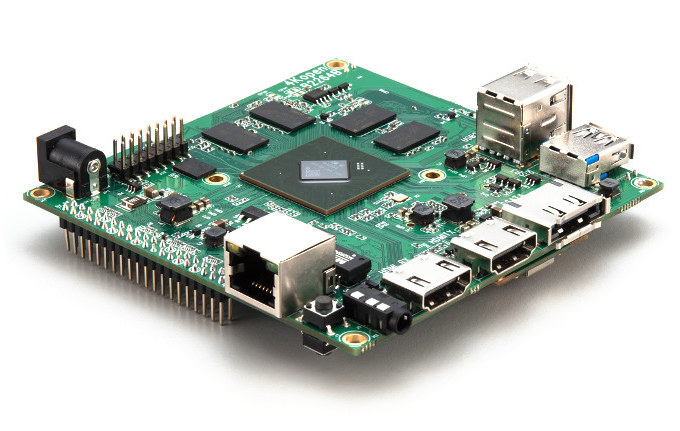Last year, FriendlyELEC launched SOM-RK3399 system-on-module (SoM) powered by Rockchip RK3399 hexa-core processor combined with 2GB DDR3 memory, 16to 64GB flash, and a built-in WiFi 5 module. Contrary to most SoM’s on the market, SOM-RK3399 could work in standalone mode thanks to two USB-C ports, although it could also be integrated into a carrier board to create a complete development board with more ports and interfaces. The company has now introduced an update with SOM-RK3399V2 CPU module with 4GB LPDDR4 RAM, as well as a small change in the layout for the LED’s and buttons, but the rest of the features remain the same. The company also appears to have changed the way they handle cooling with SOM-RK3399V2 shipping with a heatsink, while SOM-RK3399 cooling was handled by a heatsink + cooling connected to the carrier board. SOM-RK3399V2 specifications: SoC – Rockchip RK3399 big.LITTLE hexa-core processor with 2x Cortex-A72 cores […]
Pocket Popcorn Computer Handheld Linux Computer Looks Like an Improved, Faster PocketCHIP (Crowdfunding)
PocketCHIP was a Linux handheld computer powered by Allwinner R8/GR8 Cortex-A8 based CHIP board. The battery-powered device came with a small resistive display, 512 MB RAM, 4GB NAND flash, and a keyboard allowing to run Debian with PICO8 GUI so you could play retro games, access the terminal and so on. But since Next Thing Co folded last year the products are not available anymore. Since the designs were open source, Source Parts first tried to resurrect the board via their slightly modified Popcorn Computer but the Kickstarter campaign was unsuccessful. The company is now attempting to bring back PocketCHIP (sort of) with Pocket Popcorn Computer (abbreviated as Pocket P.C.) with a new design, and a much more powerful quad-core Cortex-A53 processor and overall better specs. Pocket Popcorn Computer specifications: SoC – Allwinner A64 quad-core Arm Cortex-A53 CPU with Arm Mali-400MP2 GPU System Memory – 2GB DDR3 RAM Storage – […]
Rock Pi S mini SBC Now Available for $15 with 512MB RAM, 512MB SD NAND Flash, WiFi & Bluetooth
Rock Pi S is a tiny single board computer powered by Rockchip RK3308 quad-core Cortex-A35 processor coupled with up to 512MB RAM, up to 1GB SD NAND flash, as well as a USB port, Fast Ethernet & optional WiFi & Bluetooth connectivity which was announced to sell for as low as $9.90 with 256MB RAM, 256MB flash and no wireless module. Seeed Studio has now started to take pre-orders for Rock Pi S with the board selling for $14.90 with 512 MB RAM, 512MB SD NAND flash, WiFi & Bluetooth. Shipping is scheduled to start on October 15th. [Update: Seeed Studio has also listed the 256MB RAM version of the board for $9.90] Rock Pi S specifications as currently sold on Seeed Studio: SoC – Rockchip RK3308 quad-core Arm Cortex-A35 processor @ up to 1.3 GHz with built-in VAD (Voice Activity Detector) System Memory – 512MB RAM Storage – MicroSD […]
$9.9 ROCK Pi S is a Tiny SBC Powered by Rockchip RK3308 Processor
Radxa launched their low cost ($40) Rock Pi 4 SBC powered by Rockchip RK3399 processor a little over 18 months ago. If you are subscribed to their mailing list, the company has now sent an email entitled “ROCK Pi Summer Updates 2019” (no link available) that reports about v1.4 of the board with 4MB SPI flash onboard, an external WiFi antenna connector, and various other small changes, as well as the announcement of RockPi PoE HAT to power the board from an Ethernet cable, and an USB 3.0 eMMC card reader. But what particularly caught my attention in the email was a new tiny single board computer powered by Rockchip RK3308 Cortex-A35 processor: Rock Pi S selling for as low as $9.9 with 256MB RAM, and targetting headless IoT & smart voice applications. Rock Pi S board specifications: SoC – Rockchip RK3308 quad-core Arm Cortex-A35 processor with built-in VAD (Voice […]
FriendlyELEC SOM-RK3399 Development Kit Targets AI & Machine Vision Applications
FriendlyELEC is better known for their low-cost tiny single board computers, but the company has also introduced systems-on-module in the past such as Smart6818 module powered by Samsung S5P6818 octa-core processor. The company has now launched another system-on-module with SOM-RK3399, which as its name implied features Rockchip RK3399 processor, as well as a corresponding carrier board mostly designed for artificial intelligence and computer vision applications. SOM-RK3399 System-on-Module Specifications: SoC – Rockchip RK3399 big.LITTLE hexa-core processor with 2x Cortex-A72 cores up to 2.0GHz, 4x Cortex-A53 cores up to 1.5GHz, Mali-T864 GPU with support for OpenGL ES1.1/2.0/3.0/3.1, OpenVG1.1, OpenCL, DX11, and AFBC, and VPU capable of handling 4K VP9 and 4K 10bits H265/H264 60fps decoding, Dual VOP, etc System Memory – Dual-Channel 2GB DDR3 Storage – 16GB eMMC 5.1 flash Networking 802.11a/b/g/n/ac, Bluetooth 4.1, Wi-Fi and Bluetooth combo module (AP6356S), dual antenna interface Realtek RTL8211E Gigabit Ethernet transceiver USB – 2x USB-C […]
Rockchip RK1808 Datasheet, TRM, Schematics and Linux SDK Released
Rockchip RK1808 is the first chip from the company fully dedicated to artificial intelligence applications. The Neural Processing Unit (NPU) features an accelerator delivering up to 3.0 TOPS and is coupled with two low power Arm Cortex-A35 cores allowing it to run Linux. We’ve had the specifications for RK1808 for a while, but the company has recently posted hardware and software resources on their open source website. On the hardware side we’ve got: RK1808 Technical Reference Manual (TRM) RK1808 datasheet PDF Schematics for the company’s official RK1808-EVB On the software side we can get the Linux SDK from Github as explained in the Wiki:
|
1 2 3 4 5 |
git clone https://github.com/rockchip-linux/repo mkdir linux cd linux ../repo/repo init --repo-url=https://github.com/rockchip-linux/repo -u https://github.com/rockchip-linux/manifests -b master -m rk1808_linux_release.xml ../repo/repo sync |
Finally configure the build and start the build process:
|
1 2 3 |
sudo apt install liblz4-tool build-essential source envsetup.sh rockchip_rk1808 ./build.sh |
After a while, or more accurately close to two hours on a Laptop with Ryzen 7 2700U processor, 8GB RAM, and hard drive, we’ll get U-boot, Linux, buildroot based rootfs, and firmware files and in […]
Nitrogen8M_Mini Single Board Computer Launched for $135 and Up
Last month we write about Nitrogen8M_Mini, the First NXP i.MX8 8M Mini SBC, but at the time, it was not available for purchase just yet. Boundary Devices has now announced the official release of the board and is taking orders / pre-orders for $135 and up. Nitrogen8M_Mini SBC Two versions are being offered either with the board only, or as part of a devkit with a 5V power supply, an 8GB microSD card with Linux OS, a battery, and serial console cable: Nit8MQ_Mini_2r8eWB with WiFi and Bluetooth, currently in stock, and sold for $155 (board only), or $175 (devkit) Nit8MQ_Mini_2r8e without wireless module, to ship in a few weeks, and sold for $135 (board only), or $155 (devkit) Nitrogen8M_Mini specifications: SoC – NXP i.MX 8M Mini with 4x Cortex A53 cores @ 1.5 to 2.0 GHz max, 1x Cortex-M4F real-time core, Vivante GCNanoUltra 3D GPU, Vivante GC320 2D GPU System […]
4Kopen UHD Video Development Platform Features STMicro STiH418 Media Processor
Back in 2016, I read news about STMicro exiting the set-top box chipset market, so I just assumed all their STiHxx processors would be phased out, and I was surprised to come across 4Kopen, described as an open 4K UHD video development platform powered by STMicro STiH418 media processor, especially it was just showcased at 2019 Integrated Systems Europe (ISE 2019) at the beginning of the month. The development board comes with 2 GB RAM, HDMI 2.0 output, HDMI 1.4 input, Gigabit Ethernet, USB 3.0, a mini PCIe slot fitted with an 802.11b/g/n WiFi module, an eSATA connector and more. 4Kopen (B2264) hardware specifications: SoC – STMicro STiH418 quad-core Arm Cortex-A9 processor @ 1.2 GHz, quad-core Mali-400 GPU, and 4x ST231 DSP (Each Core Quad issue) @ 650 MHz System Memory – 2 GB DDR3 @ 2133 MHz Storage – micro SD socket, eSATA port Video & Audio I/O Output […]


